Flying Korea's farmed dogs to safety
- Published
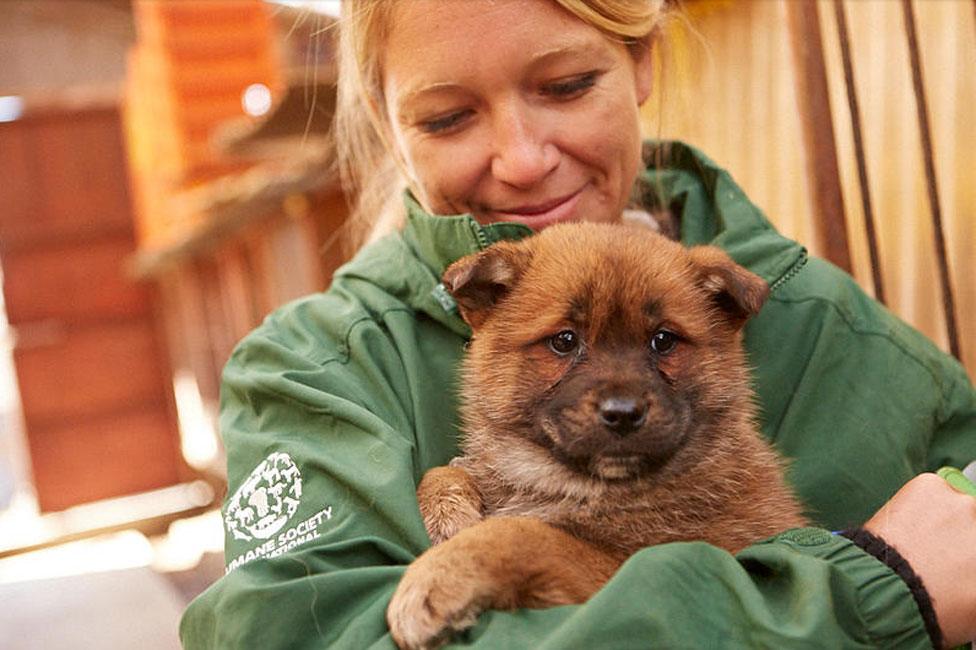
Lola Webber with a rescued dog
One of the most difficult things for Westerners to accept about living in South Korea, and some other Asian countries, is the custom of eating dogs. For many in the West, the very idea prompts feelings of nausea - while in some countries, including South Korea, it is a hallowed culinary tradition. But one group of Western campaigners now thinks it has a way of breaking the deadlock.
It is a clash of cultures - sometimes a raucous, angry clash of cultures. On one side, the activists - often Western - who can increasingly be seen at markets in China, Vietnam and South Korea protesting against the sale of dogs as food.
On the other side, the dog traders and farmers who challenge those who threaten their livelihoods. Many Asians accuse the West of hypocrisy. "You eat sheep, cow and chicken," they say. "So what's the difference?"
It is usually a dialogue of the deaf. This week, though, opponents have come to an amicable agreement. They have listened to each other and found a way forward. A farmer is freeing more than 100 of his dogs and, in return, the campaigners - from Humane Society International and the Change For Animals Foundation - have given him some cash and a business plan for a different kind of business.
The dogs were vaccinated a month ago and they will be flown out to new homes in California this week, starting on Tuesday.
Stephen Evans visits the farm as dogs are released
The farmer, left with empty, silent cages, has signed a legally binding contract. His activities will be monitored to ensure he doesn't return to the dog industry, or any other business that involves the slaughter of animals for meat.
He has also agreed to talk to other dog farmers, to encourage them to make the change. Dog farmers are often mistrustful of outsiders but are more likely to listen to one of their own.
The amount of compensation in this particular case hasn't been disclosed but sums of from $2,000 to $60,000 (£1,300 to £39,000) are on offer, depending on what the transition from farming involves - whether it's the demolition of dog sheds or buying seed to sow new crops.
"Our goal is to end the dog-meat industry in Korea," says Lola Webber, a British woman who founded Change for Animals, and is the driving force behind the project. "We're working with the industry itself to do that."
The campaigners may be pushing on an open door. As South Korea becomes more affluent, attitudes and tastes are changing. Pets are becoming more popular, and people who own pets often don't like the idea of pooches on plates.
"Every farmer we've ever met has expressed an interest in leaving the dog meat industry," Lola says. "It's back-breaking work. It's a horrible job to do. They receive a lot of criticism from their families and the communities in which they live."
Just like in the fancier parts of Manhattan or London or Paris, young, fashionable people are appearing on the streets with small dogs in pouches, their snouts poking out - the dog as fashion accessory. In Seoul, there are more and more coffee shops which describe themselves as "dog friendly".
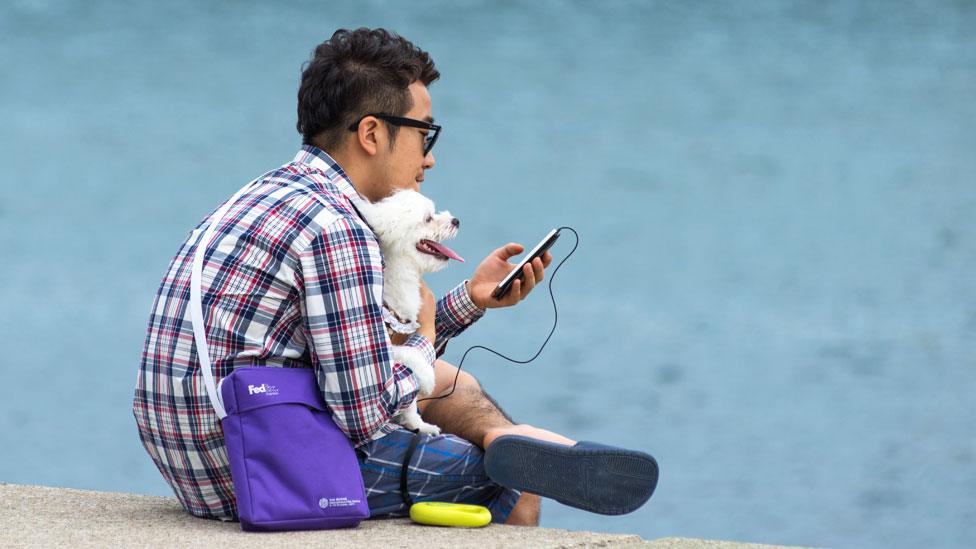
Meanwhile, dog restaurants are closing. Seoul once had 1,500 serving dog, now that figure has fallen to about 700.
But eating dog is ingrained in Korean culture, particularly at the height of summer when by ancient tradition three days are designated as special festivals and thousands of dishes of dog are served, usually in a highly spiced stew.
Dog is also boiled and the essence added to water and herbs to provide a tonic with supposed curative properties. For this reason, it's often sold in shops near hospitals.
And many Koreans share the feeling that Westerners shouldn't tell them how to live their lives.
"Koreans eat food which suits Koreans," says Kim Soo-gyun, the farmer freeing his dogs this week. "Our food cultures are different and that's why we have different views from Westerners."
Lola Webber understands why some Koreans regard Western campaigners as hypocrites, though she personally is a vegetarian and does not agree with eating meat of any kind. "Two wrongs don't make a right," is her response to the hypocrisy argument.
Her objection to the dog industry is partly that the method of slaughter is brutal.
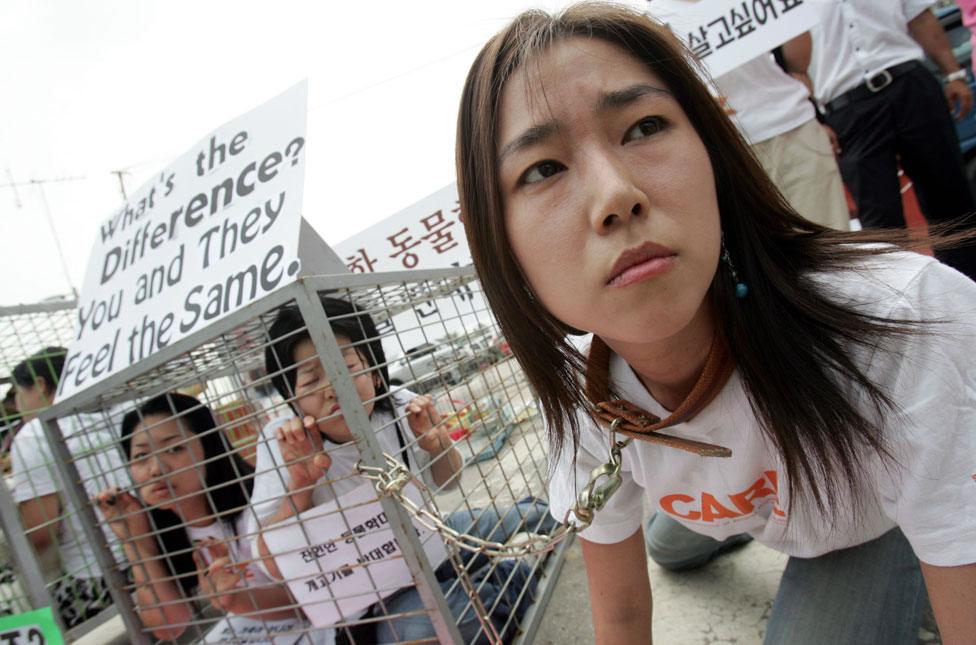
South Korea's largest animal rights group, CARE, protests at a market in SungNam in 2007
At the dog markets in Seoul it's done by electrocution - the dog, chosen by a customer, has an electrode shoved into its mouth. If it doesn't die instantly a second dose is administered.
The dogs that remain in the cages are traumatised, she argues, by the sight of these animals being killed in front of their eyes.
Traditionally, dogs were hanged and beaten to death because it was thought that the terror they experienced improved the taste. It's not clear whether this method continues in some areas.
At the Moran dog market in Seoul, traders expressed mixed feelings about their business. They were angry with protesters, confronting and roughing up one group they caught trying to take pictures. At the same time, one trader said he would love to leave and do something else for a living.
"If we had financial support, we would flatten this dog market and turn this whole area into a centre that sells dogs as pets," he said. "We've been wanting this for a long time but we have to make a living."
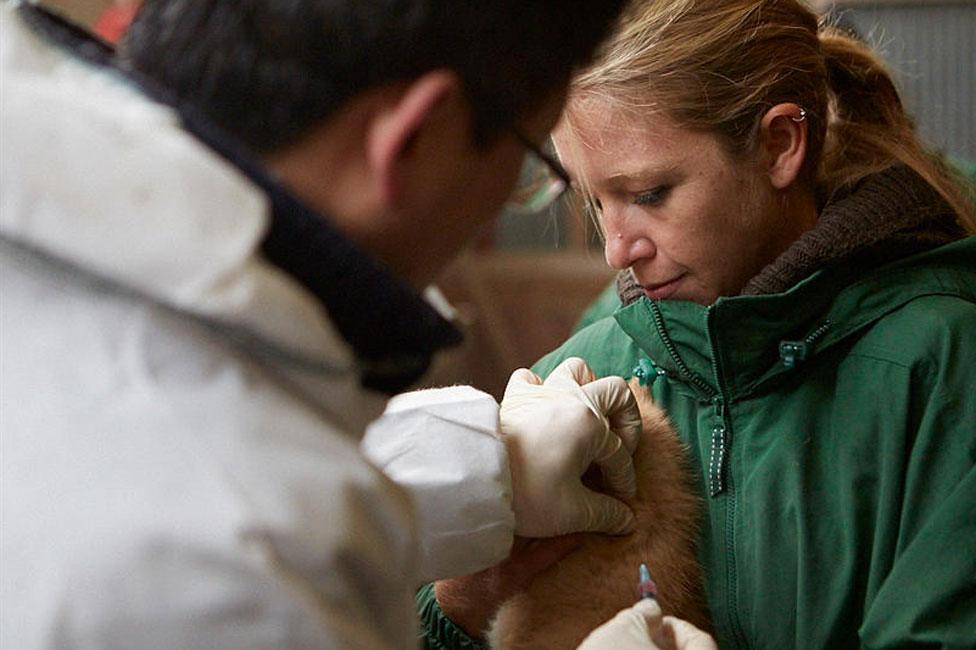
Lola Webber holds a dog while a vet gives it an injection
Closing the entire industry would be a big task. Nobody knows how many dog farms there are in Korea. They can be organised enterprises or ramshackle affairs, invariably with male, breeding dogs on chains and the younger animals in rows of cages - out in the open throughout the frozen winter and exposed to the heat of the fierce Korean summer. Some have just 100 animals, others have 10 times as many.
Eating dog has traditionally been associated with virility, so fathers often used to take sons to eat it as part of the ritual of growing up.
I attended a meeting of the Trash Club in Seoul - a group of professional thirty-something men who regularly dine together. Most had been introduced to dog by their fathers years earlier. One of them had eaten an intimate part of a dog, which is considered a macho thing to do, and been violently sick.
These men told me they have decided not to hold their male-bonding sessions in dog restaurants any more. Instead, at their last meeting they chose blow fish, which is deadly if not prepared correctly - a different kind of macho food.
A number said they would not inflict the dog-eating ritual on their own sons. Some are considering dogs as pets. Times are changing.
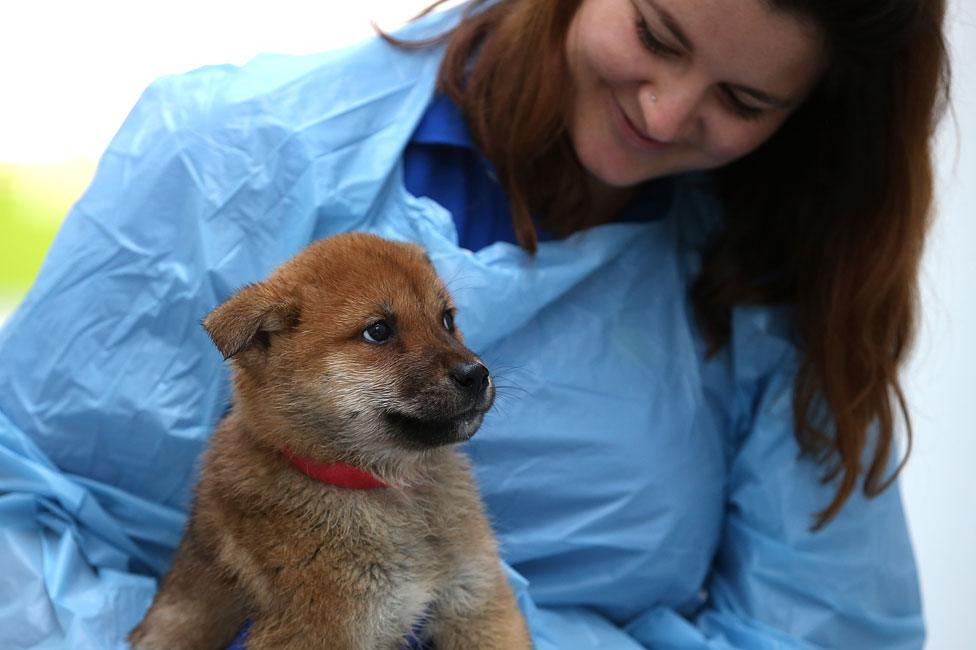
A Korean dog that was rescued earlier this year - already being looked after in San Francisco
The Victoria Derbyshire programme is broadcast on weekdays between 09:15-11:00 BST on BBC Two and BBC News Channel. Follow it on Facebook, external and Twitter, external.
Subscribe to the BBC News Magazine's email newsletter, external to get articles sent to your inbox.